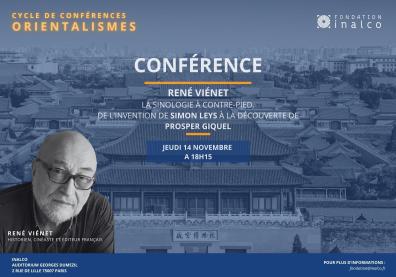René Viénet, sinology in reverse, from the invention of Simon Leys to the discovery of Prosper Giquel

René Viénet, a unique figure in the intellectual and cultural exchanges between China and France, has led a multi-faceted, multi-brilliant career.
He began studying Chinese in 1963 at Langues O', rue de Lille, with Jacques Pimpaneau, a mythical figure at the establishment. While playing a central role in the Situationist International and gaining experience in film production, René Viénet joined the CNRS in 1967, from which he was expelled, in his own words, twice, the first time for being the editor of Simon Leys's Habits neufs du Président Mao (1971), the second on the pretext that he hadn't finished his thesis, but in fact for his two films that represented France at the Cannes Film Festival (1977): Mao par lui-même and Chinois, encore un effort pour être révolutionnaires, which confront the Western gaze with the contemporary realities of Maoist China. Chairman Mao's New Clothes" is a real thunderclap that will (slowly) disabuse the Western academic mandarinate, but also (more surely) the general public, of the realities of the Cultural Revolution. Pierre Rykmans a.k.a. Simon Leys would publicly declare that he would not have published the work, which would profoundly influence his intellectual path and perception of China, without Viénet's persistence.
In addition to his academic contributions, preservation of rare Chinese films, dissemination of Chinese language teaching or publishing, René Viénet has played a pioneering role in the development of cultural and industrial exchanges with the island of Taiwan. This role has recently been extended by the publication and preservation of archives linked to Chinese modernization, such as those of Prosper Giquel, a forgotten figure in contemporary science who contributed to China's technological and educational reform in the XIXth century.
Tracing the stories of "Simon Leys's invention" and "Prosper Giquel's discovery" in context, René Viénet's talk will embody an apprehension of the Chinese world where the scholar and the pragmatist mingle, making method of polemic with chosen friends and enemies. It's with this contemporary form of "disputatio", by one of the great signatures of Langues O', that the inalco Foundation's new cycle of lectures entitled "Les Orientalismes, chemin faisant" opens.
René Viénet - éléments biographiques (309.44 KB, .pdf)